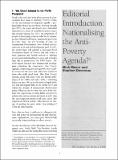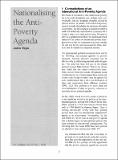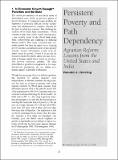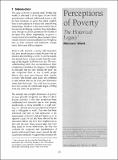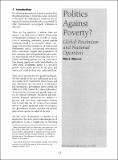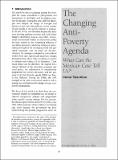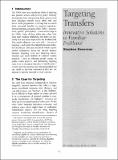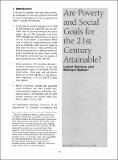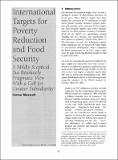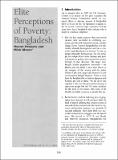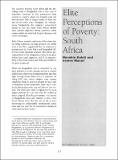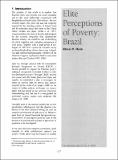Volume 30, Issue 2: Nationalising The Anti-Poverty Agenda?
Browse by
Recent Submissions
-
Editorial Introduction: Nationalising the Anti?Poverty Agenda?
(Institute of Development Studies, 01/04/1999) -
Nationalising the Anti?Poverty Agenda
(Institute of Development Studies, 01/04/1999)Summaries Although the return in the 1990s of the issue of poverty reduction to the agenda of international organisations is very welcome, an important obstacle to further progress remains. To date, the anti?poverty agenda ... -
Persistent Poverty and Path Dependency: Agrarian Reform: Lessons from the United States and India
(Institute of Development Studies, 01/04/1999)Summaries The historical experience of the United States, where aggregate wealth multiplied in abundance but persistent poverty is glaring, offers concrete illustration that growth is not a sufficient condition for poverty ... -
Perceptions of Poverty: The Historical Legacy
(Institute of Development Studies, 01/04/1999)Summaries The legacy of past perceptions of poverty and its causes have been embodied in many core approaches to measure it. In turn, the way poverty is identified and quantified, particularly in money metric terms and ... -
Politics Against Poverty?: Global Pessimism and National Optimism
(Institute of Development Studies, 01/04/1999)Summaries Is it politically feasible for the governments of developing countries to redistribute significant assets or income to the poor? There is a great deal of scepticism within international development circles. This ... -
The Changing Anti?Poverty Agenda: What Can the Mexican Case Tell Us?
(Institute of Development Studies, 01/04/1999)Summaries This article analyses how the strategies conceptualised by anti?poverty policymakers in international institutions are transferred into national?level policies in developing countries. The Mexican government's ... -
Targeting Transfers: Innovative Solutions to Familiar Problems
(Institute of Development Studies, 01/04/1999)Summaries The case for targeting cash or in?kind transfers to the poor – that it maximises cost?effectiveness and equitable allocation of scarce public resources – is partially offset by the administrative, social and ... -
Are Poverty and Social Goals for the 21st Century Attainable?
(Institute of Development Studies, 01/04/1999)Summaries The article assesses the prospects for countries attaining two important International Development Goals (IDGs) by the year 2015: halving the proportion of people living in extreme poverty; and reducing by two ... -
International Targets for Poverty Reduction and Food Security: A Mildly Sceptical But Resolutely Pragmatic View With a Call for Greater Subsidiarity
(Institute of Development Studies, 01/04/1999)Summaries International development targets adopted by UN Conferences provide political impetus, focus expenditure and help in monitoring progress. However, simple targets can misrepresent complex realities and distort ... -
Elite Perceptions of Poverty: Bangladesh
(Institute of Development Studies, 01/04/1999)Summaries The Bangladeshi national elite are distanced from and unthreatened by poverty and the poor. Medium?term solutions to poverty, resting on a belief in the importance of ‘increasing awareness’ through education, ... -
Elite Perceptions of Poverty: South Africa
(Institute of Development Studies, 01/04/1999)Summaries Elite perceptions of poverty in South Africa are affected by the distinctive character of social segmentation there. The huge size of segments and the immense distances (social, economic and psychological) between ... -
Elite Perceptions of Poverty: Brazil
(Institute of Development Studies, 01/04/1999)Summaries The article discusses how Brazilian elites view poverty and social inequality and offers some preliminary comparisons with the perceptions of elites in Bangladesh and South Africa. Based upon survey research, ...

